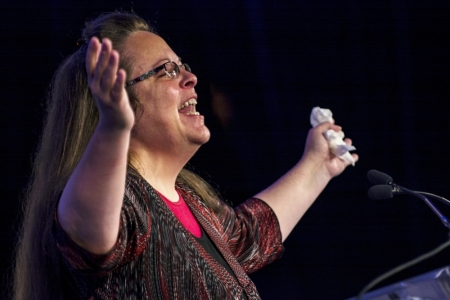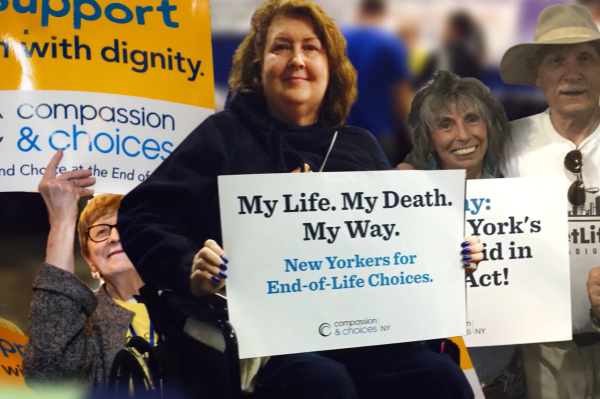If the Christian Right Is Dying, Why Does It Keep Winning?

The smug reporting on the imminent demise of the Christian Right was prevalent during President Barack Obama's second term, with most mainstream media missing all the telling signs that suggest the Christian Right was not only alive, but a force to be reckoned with.
These reports were especially pronounced last month, when it was assumed the Christian Right backed the wrong proverbial horse, Donald Trump, in the race to be president. Hillary Clinton would be the last nail in the Christian Right's coffin, many had assumed and hoped.
Instead, the Christian Right played a significant role in helping Trump win. One of four voters were self-identified white evangelicals, and of them, 81 percent voted for Trump. As Sean Trende pointed out for Real Clear Politics, Trump got more votes from white evangelicals than Clinton got from blacks and Latinos combined.
This number even underestimates the strength of the Christian Right because it excludes conservative Catholics and non-white Christian Right supporters. (The exit polls only asked whites if they consider themselves "born again or evangelical.")
But there were signs of Christian Right strength even before Trump's victory.
For many progressives, Kim Davis perfectly symbolized the death of the Christian Right. They celebrated when the Kentucky county clerk was thrown in jail for refusing to issue a marriage license to a same-sex couple. They mocked her faith. They accused her of hypocrisy because she was divorced (before she was a Christian). They even made fun of her and her husband's clothing preferences, particularly the sweater she wore to the 2016 State of the Union.
Amid all this ridicule, progressives missed the big picture: Kim Davis won.
What Kim Davis wanted was an accommodation, so that she personally would not have to certify marriage licenses for same-sex couples due to her religious convictions. Same-sex couples would still be able to obtain a marriage license out of her office with this accommodation.
This fix was simple. All Kentucky had to do was replace county clerk certification with some other official stamp, such as the governor's signature. It would be a win-win solution. Davis would get what she wanted and same-sex couples could still be able to get a marriage license.
Progressives, however, were not in an accommodating mood; only win-lose would satisfy. Many followed the advice of Harvard Law Professor Mark Tushnet, who, in May, compared conservative Christians to Nazis, and advised that progressives need not fear a backlash.
"When specific battles in the culture wars were being fought, it might have made sense to try to be accommodating after a local victory, because other related fights were going on, and a hard line might have stiffened the opposition in those fights. But the war's over, and we won," he wrote.
Similarly, an April 2015 New York Times op-ed by Frank Bruni argued that Christians "must be made" to change their views about homosexuality. That same month, Hillary Clinton told a Manhattan audience, "deep-seated cultural codes, religious beliefs and structural biases have to be changed" about abortion. And an August 2016 op-ed by liberal evangelical David Gushee predicted conservatives would continue to lose the culture war, claiming that efforts to protect their freedom to live according to their beliefs regarding homosexuality are done "under the guise of religious liberty." The thought was echoed in September when the chairman of the U.S. Commission on Civil Rights wrote a report arguing that "religious freedom" is a code word for bigotry.
These examples illustrate progressive's head-in-the-sand-ism over the culture wars. As these words were being said and written, progressives were already losing due to the backlash that Tushnet said they need not fear.
Kentucky had a gubernatorial election in 2015. The Republican, Matt Bevin, strongly supported Davis and used her story to mobilize supporters. The Democrat, Jack Conway, supported gay marriage as the state's attorney general. The week of the election, media reports said Conway would win, with one poll showing him leading by five points. Bevin won by eight points and Davis got her accomodation.
Rather than symbolizing the death of the Christian Right, Davis illustrates one reason Republicans have been winning — she went into jail a Democrat and came out a Republican.
There were already signs of a backlash in other places as well.
With the Christian Right's help, Republicans took control of Congress in the 2014 midterm elections. They gained a net nine seats in the Senate to gain control with a 54 seat majority. They maintained control of the House and gained another 13 seats.
In state legislatures, Democrats have lost nearly 1,000 seats since Obama took office. Democrats currently hold both houses in only 13 states, compared to 32 for Republicans. Democrats hold a trifecta (both houses and the governorship) in only six states, compared to 25 trifectas for Republicans. According to one analysis, the Republican Party is in its strongest position since 1928.
It was not just red states that saw a backlash. In California, conservative Christians won an important victory as well. The state had tried to pass a bill that would have severely limited the freedom of religious colleges that held traditional views on gender and sexuality. After pushback from the state's religious institutions, a coalition that was multi-racial, multi-ethnic and multi-faith, the effort was abandoned.
Amid all these signs of a backlash, Obama thought 2016 would be a good year to force a radical progressive view of gender onto every school in the nation, including private schools. He warned schools that they could be in violation of a civil rights law if they didn't base bathroom use policy upon gender identification rather than a student's actual gender. That policy will certainly be undone with Trump's victory.
The transgender bathroom effort occurred on many fronts. In Virginia, a federal judge ruled that a transgender male student must be allowed to use the boys bathrooms and locker rooms. In Charlotte, N.C., an ordinance was passed to force the transgender rules on all public facilities. The North Carolina legislature and governor passed a law, HB 2, to undo the Charlotte effort and the U.S. Supreme Court temporarily blocked the Virginia judge's decision.
In Houston, Mayor Annise Parker attempted to use intimidation tactics, including subpoenas of pastor sermon notes and emails, to prevent a referendum on the city's pro-LGBT anti-discrimination law. The effort failed. The referendum went on the 2015 ballot and passed with 62 percent of the vote in the Democratic-majority city.
The Christian Right has suffered some losses, however.
It lost some state ballot intiatives on the issues of assisted suicide, marijuana legalization and gambling.
In North Carolina, the Human Rights Campaign and other LGBT groups made the governor's race ground zero in the transgender bathrooms fight. At the time of this publication, the Republican, Pat McCrory, will likely lose, but there could be a recount. But even if McCrory loses, the fact that progressives would be barely able to win after throwing so many resources into the state suggests a draw, rather than a decisive win, in that state. Plus, without the state legislature, they will be unable to undo HB 2, so the main goal would still be a losing effort.
Trump was not the Christian Right's favored candidate during the Republican nominating contests. Most conservative church-going Christians supported Ted Cruz or Marco Rubio, with most of the rest divided among the rest of the non-Trump candidates.

They were reminded of this when Trump said, during his first post-election interview, that he would do nothing to fight the Supreme Court's gay marriage decision. And while he reaffirmed his commitment to nominating pro-life judges, he indicated an unwillingness to do more than that on the abortion issue.
Christian Right influence in the Trump administration will not come from Trump's ideological leanings. Instead it will be dependent upon the leverage it has due to helping him win, the fact that he'll need the movement to help him win again in 2020, and the number of high-level appointments it will get. Christian Right leaders understand, I suspect, that maintaining influence in the Trump administration will require more effort than when George W. Bush was in the White House (which was a full-time job even then).
Regardless of the disappointment that Trump became the Republican nominee, there were still signs of strength in how the Christian Right dealt with that setback.

Tony Perkins, president of the most influential Christian Right organization, Family Research Council, endorsed Cruz in the primary and Trump in the general election.
In an Oct. 12 op-ed for The Christian Post, he noted that evangelicals are "[c]aught between a candidate who doesn't share their sense of decency [Trump] and a woman [Hillary Clinton] who stands against everything they believe in ...."
What an endorsement!
Perkins was not alone. Most Christian leaders were neither enthusiastic Trump supporters, like Jerry Falwell Jr., nor "nevertrumpers," like Russell Moore. Most were reluctant Trump supporters, like Perkins.
Perkins et. al. were essentially telling their fellow conservative Christians: "I know Trump is a scoundrel but we must vote for him anyway because the alternative is so much worse."
If you're looking for an inspiring political mobilization message, you can find many better examples.
But here is the interesting part: It worked!
The Christian Right successfully mobilized its base with an uninspiring appeal to political pragmatism. This is a sign of strength for a political movement. What could it do if it had a general election candidate it actually liked?





















